Grow Lights Market Research, 2031
The global grow lights market size was valued at $2.4 billion in 2021, and is projected to reach $27.3 billion by 2031, growing at a CAGR of 27.5% from 2022 to 2031. Grow lights are specialized lights used for growing indoor and commercial greenhouse plants. These lights help plants in the process of photosynthesis and boost healthy development and yield incredible products. Grow lights offer many benefits as it mimics the white light received from the sun. It includes longer lifespan, cooler temperature, greater efficiency, usage of full spectrum, compact size, and state rebates. These factors make it ideal for indoor, vertical farming, commercial greenhouses, and other applications.

Grow lights can be adjusted to different colors, which affect growth cycle of specific plants. It can be adjusted to change from ultraviolet (UV) spectrum to infra-red (IR) spectrum. This adjustment makes plants grow to their best potential, while maximizing potential profits. Grow lights are highly preferred for seedlings, herbs, succulents, and leafy houseplants, as they offer optimum environment for growth.
Higher efficiency offered by grow lights such as LEDs is the prime reason that drives growth of the grow lights industry during the forecast period. Furthermore, grow lights offer higher controllability and scalability, which accelerates growth of the grow lights market. Moreover, rise in adoption of vertical farming is opportunistic for the grow lights industry. Considering these factors, the grow lights market is estimated to experience exponential grow lights market growth in the future.
Cultivation of medicinal plants is expected to expand the grow lights market during the forecast period. However, high initial investments act as major restrains for the market growth. Moreover, lack of standardization results in high risk of purchasing incompatible parts hampers the market growth.
Grow Lights Market Segment Overview
The grow lights market is segmented into Offering, Technology, Spectrum, Installation Type and Application.
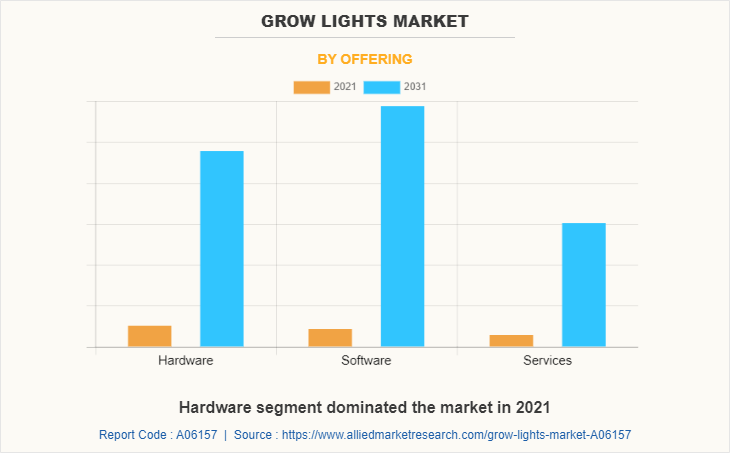
Based on offering, it is fragmented into hardware, software, and services. The hardware dominated the market, in terms of revenue in 2021, and is expected to follow the same trend during the forecast period.
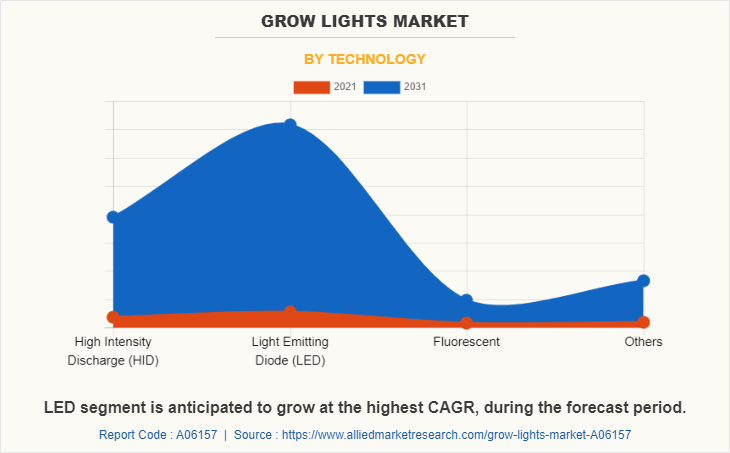
Based on technology, the market is segregated into high intensity discharge (HID), light emitting diode (LED), fluorescent and others. The light emitting diode (LED) segment dominated the market, in terms of revenue in 2021, and is anticipated to witness significant market share during the forecast period.
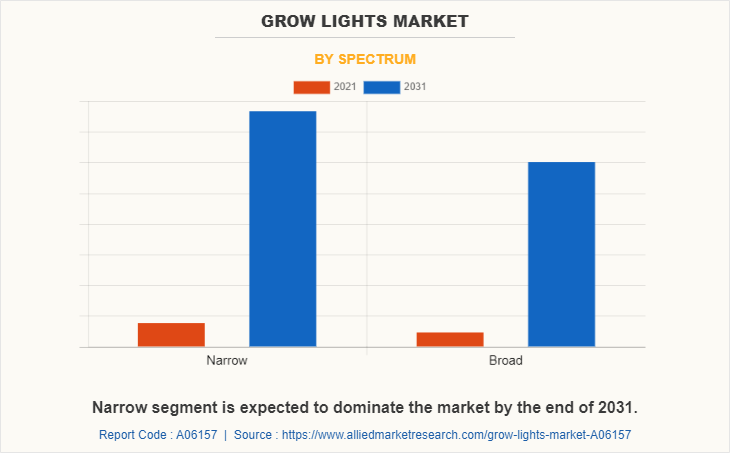
By spectrum, the market is divided into narrow and broad. The narrow segment dominated the market, in terms of revenue in 2021, and is anticipated to witness significant growth in grow lights market share during the forecast period.
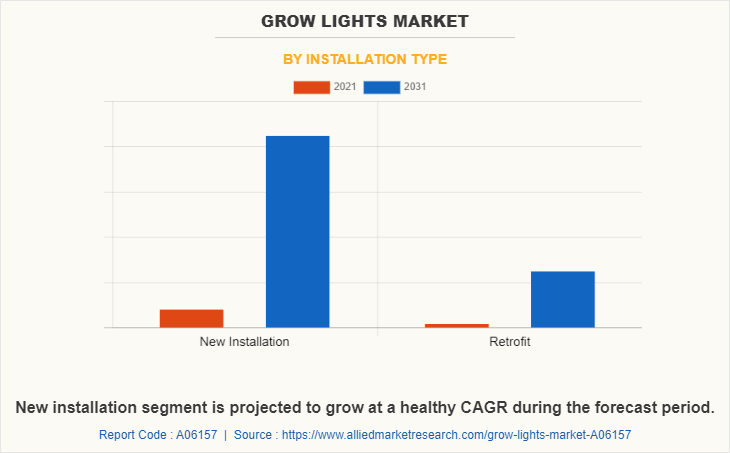
By installation type, the market is divided into new installation, and retrofit. Both new installation and retrofit segments are further bifurcated into remote and touch. The grow lights market for the new installation segment was highest in 2020, and is expected to grow at a high CAGR from 2022 to 2031.
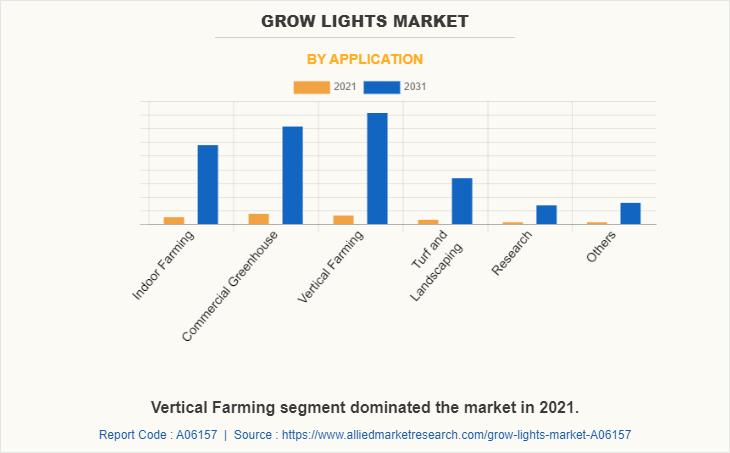
By application, the market is divided into indoor farming, commercial greenhouse, vertical farming, Turf & landscaping, research, and others. The market share for the commercial greenhouse segment was highest in 2021, and the others segment is expected to grow at a high CAGR from 2022 to 2031.
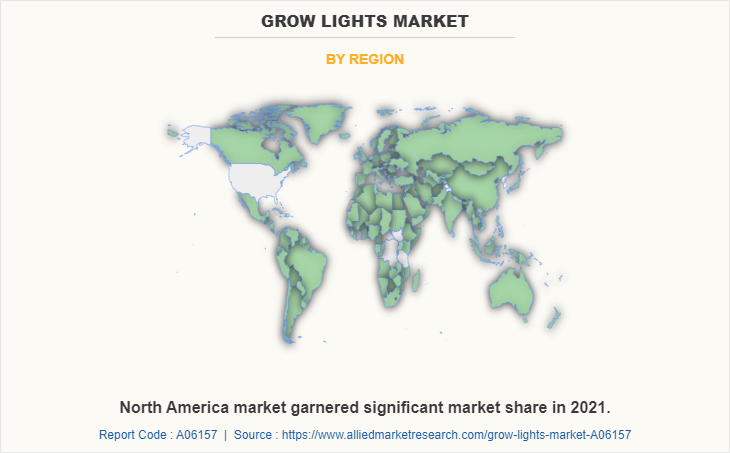
Region-wise, the grow lights market forecast trends are analyzed across North America (the U.S., Canada, and Mexico), Europe (the UK, Germany, France, Italy, and Rest of Europe), Asia-Pacific (China, Japan, India, South Korea, and Rest of Asia-Pacific), and LAMEA (Latin America, the Middle East, and Africa). The Asia-Pacific grow lights market is expected to grow at the highest rate during the forecast period.
Top Impacting Factors
Significant factors that impact the growth of the grow lights market outlook include rise in demand for energy efficient grow lights. Moreover, significant rise in glass house lighting by various organizations has been observed. However, initial high investment and set-up costs may hamper the growth of the market. On the contrary, growth in the cultivation of medicinal plants is expected to offer potential growth opportunity for the grow lights market during the forecast period.
Competitive Analysis
Competitive analysis and profiles of the major grow lights market players, such as BIOS Lighting, Fluence (Osram), GE Current, Heliospectra AB, HORTILUX SCHRÉDER, Kroptek, SANlight GmbH, Signify N.V., Valoya and Vertically Urban are provided in this report.
Key Benefits For Stakeholders
This report provides a quantitative analysis of the market segments, current trends, estimations, and dynamics of the grow lights market analysis from 2021 to 2031 to identify the prevailing grow lights market opportunities.
The market research is offered along with information related to key drivers, restraints, and opportunities.
Porter's five forces analysis highlights the potency of buyers and suppliers to enable stakeholders make profit-oriented business decisions and strengthen their supplier-buyer network.
In-depth analysis of the grow lights market segmentation assists to determine the prevailing market opportunities.
Major countries in each region are mapped according to their revenue contribution to the global market.
Market player positioning facilitates benchmarking and provides a clear understanding of the present position of the market players.
The report includes the analysis of the regional as well as global grow lights market trends, key players, market segments, application areas, and market growth strategies.
Grow Lights Market Report Highlights
| Aspects | Details |
| By Offering |
|
| By Technology |
|
| By Spectrum |
|
| By Installation Type |
|
| By Application |
|
| By Region |
|
| Key Market Players | bios lighting, valoya ltd, Kroptek, hortilux schreder, SANlight GmbH, heliospectra ab, Fluence (Osram), Signify N.V., GE Current |
Analyst Review
for less than a decade, grow lights in the horticulture industry were used mainly as research tools and novelty. Some of the biggest technical challenges in utilizing grow light efficiently for agriculture include shadowing, glaring, cleaning, and color separation. However, this is quickly changing. Prices of grow lights have considerably reduced due to various alternatives offered in the market and efficiencies have substantially increased to critical point where a lot of applications are included.
Manufacturers of grow light are working meticulously to offer customer-oriented solutions across the globe. Every project is unique in the horticulture lighting industry; and efficiency is a critical factor. Other factors include region, crop, and customer requirements. There is no exact size of grow light that fits for all stages of plants in horticulture, but having the right combination of spectrum, efficiency, and reliability are critical parameters for success as a supplier to these manufacturers. Moreover, manufacturers continue to focus on developing most efficient grow lights in visible spectrum and currently offer best products in the visible spectrum.
Surge in demand for energy saving grow lights is driving the need to enhance grow light applications such as vertical farming, indoor farming, rooftop farming and others. Moreover, prime economics, such as the U.S., China, Germany, Netherlands and Japan, plan to develop and deploy next generation grow light solutions across various sectors.
Among the analyzed regions, North America exhibits the highest adoption rate of grow lights and has been experiencing massive expansion of the market. On the other hand, Asia-Pacific is expected to grow at a faster pace, predicting lucrative growth due to emerging countries, such as China, Japan, and India, investing in these technologies. Regions, such as the Middle East and Africa, are also expected to offer new opportunities in the grow light market in future.
Globally, various key players and government agencies are investing in grow light to make them compatible with various industrial platforms. For instance, on April, 2022, BIOS joined the illuminated Partner Program with OCL Architectural Lighting. This relationship combines OCL's high-quality luminaires with BIOS SkyBlue LED Solutions' inherently stunning performance, which will be helpful in the development of BIOS's human-centric product line. In addition, in February 2022, Fluence by OSRAM launched intercanopy lighting solution, VYNE. The company's latest luminaire comes with multiple spectral options, allowing growers to balance light efficiency with crop quality and yield. All these developments across grow light showcase lucrative growth opportunities for the market growth.
The key players profiled in the report include BIOS Lighting, Fluence (Osram), GE Current, Heliospectra AB, HORTILUX SCHRÉDER, Kroptek, SANlight GmbH, Signify N.V., Valoya and Vertically Urban.
The global grow lights market was valued at $2.4 billion in 2021 and is projected to reach $27.3 billion by 2031, growing at a CAGR of 27.5% from 2022 to 2031.
The grow lights market encompasses specialized lighting solutions designed to support indoor and greenhouse plant cultivation by facilitating photosynthesis and promoting healthy plant development.
The grow lights market features several prominent companies, including Signify Holding, General Electric Company, and Osram Licht AG.
urope held the largest share of the grow lights market in 2021, attributed to the early adoption of advanced farming technologies and the presence of key industry players in the region.
The grow lights market is driven by the higher efficiency of LED grow lights, increased controllability and scalability, and the rising adoption of vertical farming practices.
Challenges in the grow lights market include high initial investments and a lack of standardization, leading to potential incompatibility issues among components.
Loading Table Of Content...



